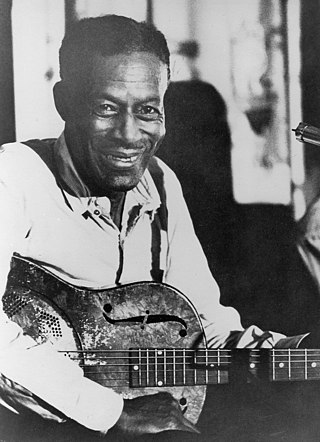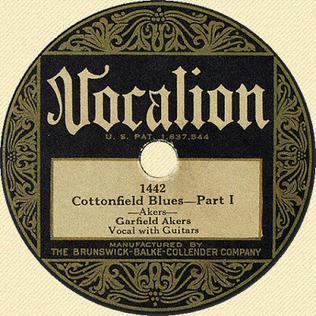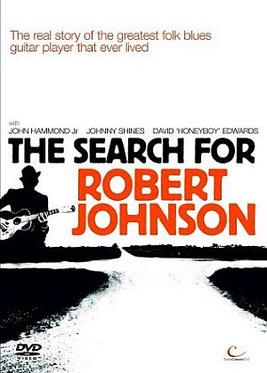
Robert Leroy Johnson was an American blues musician and songwriter. His singing, guitar playing and songwriting on his landmark 1936 and 1937 recordings has influenced later generations of musicians. Although his recording career spanned only seven months, he is recognized as a master of the blues, particularly the Delta blues style, and as one of the most influential musicians of the 20th century. The Rock and Roll Hall of Fame describes him as perhaps "the first ever rock star".

Edward James "Son" House Jr. was an American Delta blues singer and guitarist, noted for his highly emotional style of singing and slide guitar playing.

Charlie Patton, more often spelled Charley Patton, was an American Delta blues musician and songwriter. Considered by many to be the "Father of the Delta Blues", he created an enduring body of American music and inspired most Delta blues musicians. The musicologist Robert Palmer considered him one of the most important American musicians of the twentieth century.

Booker T. Washington "Bukka" White was an American Delta blues guitarist and singer. His first full-length biography, The Life and Music of Booker "Bukka" White: Recalling the Blues (2024), has been published by the University Press of Mississippi.

Willie Lee Brown was an American blues guitar player and vocalist. He performed and recorded with other blues musicians, including Son House and Charlie Patton, and influenced Robert Johnson and Muddy Waters. Brown is considered one of the pioneering musicians of the Delta blues genre.

"Love in Vain" is a blues song written by American musician Robert Johnson. Johnson's performance – vocal accompanied by his finger-style acoustic guitar playing – has been described as "devastatingly bleak". He recorded the song in 1937 during his last recording session and in 1939 it was issued as the last of his original 78 rpm records.
King Solomon Hill is the name assigned to a blues singer and guitarist who recorded a handful of songs in 1932. His unique guitar and voice combined to produce a sound that has been described as haunting. After much speculation and dispute, he has been identified as Joe Holmes, a self-taught guitarist from Mississippi.
Henry Columbus Speir was an American "talent broker" and record store owner from Jackson, Mississippi. He was responsible for launching the recording careers of most of the greatest Mississippi blues musicians in the 1920s and 1930s. According to blues researcher Gayle Dean Wardlow, "Speir was the godfather of Delta Blues" and was "a musical visionary [without whom] Mississippi's greatest natural resource might have gone untapped." A historical marker commemorates his life and work.

"Stop Breaking Down" or "Stop Breakin' Down Blues" is a Delta blues song recorded by Robert Johnson in 1937. An "upbeat boogie with a strong chorus line", the lyrics are partly based on Johnson's experience with certain women:

"Dust My Broom" is a blues song originally recorded as "I Believe I'll Dust My Broom" by American blues artist Robert Johnson in 1936. It is a solo performance in the Delta blues-style with Johnson's vocal accompanied by his acoustic guitar. As with many of his songs, it is based on earlier blues songs, the earliest of which has been identified as "I Believe I'll Make a Change", recorded by the Sparks brothers as "Pinetop and Lindberg" in 1932. Johnson's guitar work features an early use of a boogie rhythm pattern, which is seen as a major innovation, as well as a repeating triplets figure.
Gospel blues is a form of blues-based gospel music that has been around since the inception of blues music. It combines evangelistic lyrics with blues instrumentation, often blues guitar accompaniment.

Garfield Akers was an American blues singer and guitarist. He had sometimes performed under the pseudonym "Garfield Partee". Information about him is uncertain, and knowledge of his life is based almost entirely on reports of a few contemporary witnesses.
Big Chief Henry's Indian String Band was a Choctaw Indian string band from Oklahoma, United States. The band was composed of members of the Hall family—Henry, father, on vocals and fiddle; and sons Clarence on guitar and Harold on banjo. They played from Wichita, Kansas.
Charley Booker was an American blues singer and guitarist from the Mississippi Delta, who recorded in the early 1950s for Modern Records.

The Search for Robert Johnson is a 1992 British television documentary film about the American Delta blues musician Robert Johnson, hosted by John Hammond, and produced and directed by Chris Hunt. In the film, Hammond journeys through the American Deep South to pursue topics such as Johnson's birth date, place and parents, his early musical development, performances and travels, romances, his mythic "pact with the devil," his death in the late 1930s, the discovery of possible offspring, and the uncertainty over where Johnson is buried. Throughout, Johnson's music is both foreground and background, from recordings of Johnson and as performed on camera by Hammond, David "Honeyboy" Edwards, and Johnny Shines.

"Shake 'Em On Down" is a Delta blues song by American musician Bukka White. He recorded it in Chicago in September 1937, two months before being incarcerated at the infamous Parchman Prison Farm in Mississippi.
Henry "Son" Sims was an American Delta blues fiddler and songwriter. He is best known as an accompanist for Charley Patton and the young Muddy Waters.
Hayes McMullan was an American Delta blues singer, guitarist and songwriter. He was also employed at various times as a sharecropper and as a deacon and was a civil rights activist.

American blues musician Robert Johnson (1911–1938) recorded 29 songs during his brief career. A total of 59 performances, including alternate takes, were recorded over a period of five days at two makeshift recording studios in Texas. Producers selected 25, which Vocalion Records issued on 12 two-sided 78 rpm record singles between 1937 and 1939. These went out-of-print, but were the only source of Johnson's work until his recordings were eventually issued on albums beginning in 1959. In addition to those on the original singles, another 17 recordings have been released.











